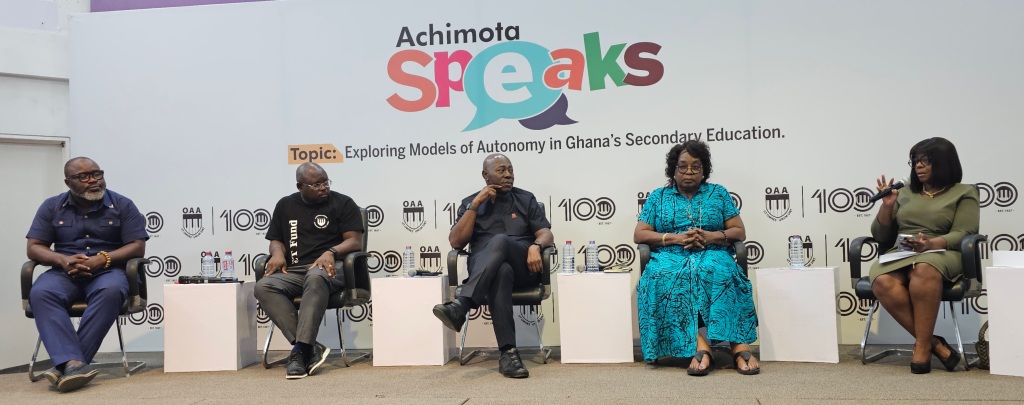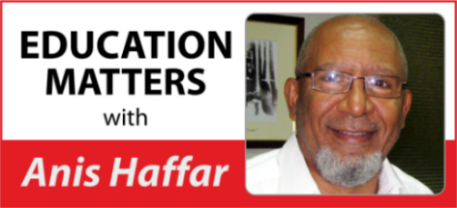|
Getting your Trinity Audio player ready...
|
Exploring Models of Autonomy in Ghana’s Secondary Education
Achimota School must be applauded for the engaging series of discussions relating to the future of secondary education in Ghana. Under the banner of “Achimota Speaks” some earlier discussions were held at the Ghana Academy of Arts and Sciences. A previous one related to the financing of primary and secondary education was led by Prof. Ato Essuman of the Methodist University.
The series captured large audiences indicating the keen interest various stakeholders attach to such pressing educational issues. The most recent one – Thursday, March 21, 2024 – was held at the British Council. It featured Moses Kwesi Baiden, Jr. speaking to the theme, “Exploring Models of Autonomy in Ghana’s Secondary Education”.
Mr Baiden – the CEO & founder of the Margins ID Group – happens to be the newly elected Ebusuapanyin of MOBA National, succeeding Captain (Rtd) Paul Forjoe. In his presentation, he shared sentiments of similar interests with the Achimotan fraternity led by the President of the Old Achimotan Association, Akora Joel Nettey, the executive secretary Eunice Quarcoopome, and chairman of the “Achimota Speaks” planning committee, E. Kwasi Okoh.

Panelists from left: Kofi Asare, Yaw Benneh Amponsah, Moses Baiden, Rev Afo Blay, moderator – Dzifa Bampoe
Reforms needed
In his delivery, Baiden noted that the complete control of the government and Ministry of Education of secondary schools and their boards, including decisions on hiring of teachers, policy making, curriculum, etc, is seen by the alumni of secondary schools as needing reforms. And that called for the introduction of a degree of autonomy to allow alumni, churches, the private sector, and other relevant stakeholders some appropriate degrees of control to contribute ideas and co-administer secondary schools for better educational outcomes.
He said, “That is the reason why we have all gathered here today: to brainstorm, discuss and rediscover the golden age of second-cycle education because we recognize that something is amiss, urging us to explore new models of autonomy in Ghana’s second-cycle education.”
Appreciating that education must be free as much as possible when a country can afford it, he suggested a collaboration between public, private, civil societies, NGOs, etc., to improve outcomes based on international benchmarks.
Baiden agreed that the Free Senior High School (SHS) initiative was laudable: democratising access to education, alleviating financial burdens on families, enhancing infrastructure, and equipping students with the necessary skills for socioeconomic advancement.
He noted, however, that while these goals remain crucial, the reality of implementation has presented some challenges: “overcrowded classrooms, stretched resources, and often difficult learning environments. Additionally, the rapid expansion of infrastructure has struggled to keep pace with demand, resulting in inadequate facilities in secondary schools in some cases.”
He asserted that parents, recognizing the importance of their children’s education and their ability to compete are grappling with difficult choices. Many who can afford it feel compelled to transfer their children to private institutions, despite the considerable financial strain that entailed.
By decentralizing decision-making authority and fostering collaboration among relevant stakeholders, appropriate models can promote accountability, responsiveness, and innovation in education.
He was of the view that free Senior High School (SHS) system faced the reality of budgetary constraints and infrastructural challenges hindering its full effectiveness. And that has led to overcrowded classrooms, shortages of teaching materials, and delays in the disbursement of grants.
Mission schools
He asserted that since Mfantsipim and other mission schools receive government assistance and are thus categorized as government-assisted mission schools, “The assumption then is that we can independently and legally decide to waive this assistance or re-negotiate our relationship with the government for autonomy in decision-making, which will have better outcomes and make these schools sustainable.”
For him, “This can be achieved through the adoption of the best public-private partnership models to deliver high-quality education. Under this system, students who can afford to pay full price for education will do so, while brilliant needy students will be partly subsidized by the government and by the endowment fund.”
He insisted that “We must employ meritocratic, transparent, and effective eligibility criteria, based on students’ academic excellence and comprehensive needs assessments to produce the best in human capital for Ghana, Africa, the diaspora.”
Baiden noted that schools like Achimota and other government-owned secondary schools, because of their legal status, may adopt some tried and tested autonomy models associated with government-owned schools, in order to achieve the best outcomes and produce the brightest students for the local and international labour market.
The proposed models emphasize the importance of meritocracy, where scholarships are awarded to deserving students based on both financial needs and academic merits. This ensures that those who can afford to pay for education contribute to the school’s sustainability while also providing opportunities for talented but financially disadvantaged students to access that same global, high-quality education, all backed by an endowment fund.
The MOBA FUND
A Ten Million Dollar fund (USD10, million) was launched in 2013 to help power the Mfantsipim Renaissance Project, and to strengthen MOBA and the Methodist Church to play their critical role, in ensuring, that the dream of Mfantsipim endures, in a new age of hope, passion and vision.
He concluded that “Collaboration, autonomy, and semi-autonomy of the administration and ownership of secondary schools in Ghana (being championed by alumni) are essentially exploratory models to address the challenges still facing second-cycle education in Ghana, and preparing them not to challenge, but also support and enhance free SHS to the next level.”
Source: Anishaffar


